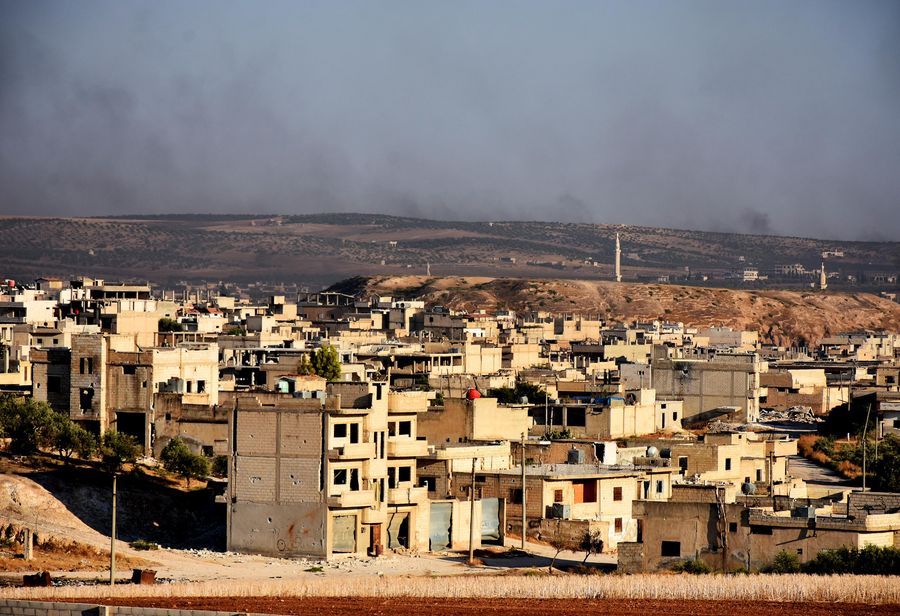
A general view of the town of Khan Shaykhun, Idlib, Syria on August 22, 2019. (Xinhua)
The Syrian army succeeds to fully secure several adjacent towns in the northern countryside of Hama.
DAMASCUS, Aug. 23 (Xinhua) -- The Syrian army on Friday fully secured the entire northern countryside of the central province of Hama for the first time since 2012, the state media reported.
After capturing the strategic town of Khan Shaykhun in the southern countryside of Idlib province in northwestern Syria, the Syrian army succeeded to fully secure several adjacent towns in the northern countryside of Hama, the official SANA news agency reported.
The army captured the towns of Al-Lataminah and Kafr Zita as well as Latmin and Morek and other towns in northern Hama, securing the entire northern countryside of Hama from the rebel groups, according to SANA.
The Syrian TV showed footage of the military presence in the recently taken areas, citing government sources as saying that efforts are being exerted to secure the medical help and other basic necessities for the people who will return to their homes after the liberation.
Meanwhile, the Syrian Observatory for Human Rights said the army fully captured the northern countryside of Hama for the first time since 2012, noting that these areas were controlled by the Hayat Tahrir al-Sham (HTS), the umbrella group of the al-Qaida-linked Nusra Front.
The UK-based watchdog group said the rebels withdrew from these areas and the army entered without a fight as the rebels started withdrawing after the army captured Khan Shaykhun in adjacent Idlib countryside, fearing they would be completely besieged.
The Observatory said that a Turkish observation point in Morek town in northern Hama is besieged by the Syrian army.
The watchdog said that Turkey may ask for a safe exit for Turkish soldiers in that area.
It's worth noting that the countryside of Hama and the adjacent Idlib province are included in the de-escalation zones' deal established by Russia and Turkey last September.
Under the deal, Turkish observation points were set up in areas in Idlib and Hama.
However, the deal failed to materialize as the al-Qaida-linked Nusra Front rejected to withdraw and battles flared last April.
Earlier this month, Russia and Turkey supervised a new cease-fire in the de-escalation zone, but it was quick to fall apart.
The Observatory said Friday that the army has so far captured 29 areas in Idlib and Hama since early this month.
The army has recently advanced on the town of Khan Shaykhun in a bid to capture it and secure the part of the main Damascus-Aleppo highway near Idlib.
A day earlier, the Syrian government declared opening a humanitarian corridor for civilians desirous of leaving battlefield areas in the countryside of Idlib and Hama, according to a foreign ministry statement.
The corridor was set up in the Souran area in the northern countryside of Hama province to enable the civilians to leave rebel-held areas in the countryside of Hama and the adjacent countryside of Idlib province in northwestern Syria.
The Syrian Foreign Ministry said the measure comes in light of the Syrian government's keenness to alleviate the suffering of the civilians and meet their humanitarian needs, including medical help and shelters.
Several Turkey-backed rebel groups are located in the Idlib province near the Turkish border, but the most powerful group there is the HTS.
For the Syrian army, securing Idlib would almost deal a blow to the over eight-year-long insurgency against the administration of President Bashar al-Assad.
Idlib is also strategically important as it shares a border area with Turkey to the north. It's also close to the coastal province of Latakia, the hometown of Assad, which contains a Russia-run air base repeatedly targeted by rebel drones launched from Idlib.
The capital city of Idlib also lies close to the international road linking the capital Damascus with Aleppo province in northern Syria.
Around 3 million people are living in Idlib, including those evacuated from many other areas during the surrenders of the rebels.



